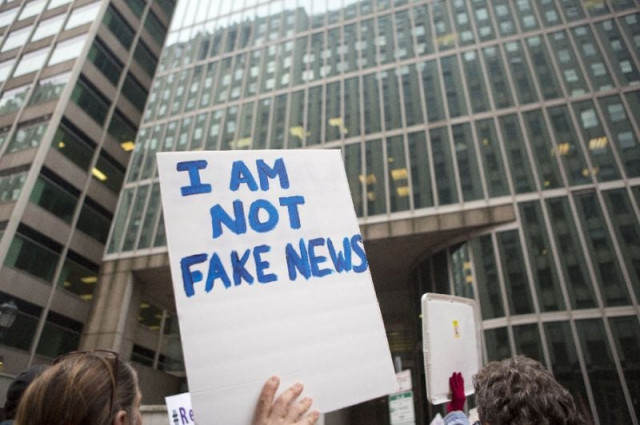Fighting fake news
Pakistan, with its burgeoning forwarded-Whatsapp-message-equals-journalism culture, is unsurprisingly absent

PHOTO: AFP
The list of signatories makes for interesting reading — both for who has, and who has not signed it. Pakistan, with its burgeoning forwarded-Whatsapp-message-equals-journalism culture, is unsurprisingly absent. But also absent is the United States, which might also be unsurprising, as the country’s president was elected in no small part because of fake news and who remains, arguably, the most prominent source of fake news in the US, having told well over 10,000 lies during his presidency, according to The Washington Post.
Another oddity was India, which did sign the agreement. No matter how anyone views Kashmir — as a multilateral, bilateral, or internal Indian issue — the fact of the matter is that around 12 million residents of the region, all citizens of India, have been denied access to information in a media lockdown that is now in its eighth week. Hardly the actions of a country committed to promoting “independently reported, diverse and reliable” information.
And this is without even commenting on the absolute propaganda machine that Indian media has degenerated into, as many once-sane voices also beat the propaganda drum of the ruling party, either in a chameleon quest for survival under a fascist regime, or having honestly fooled themselves. The BJP has also been using state ads as a weapon for a long time. The party itself is among the biggest advertisers in the country, which would be fine, except for the fact that it has also enforced a policy of withholding state ads to ‘unfriendly’ media outlets, choking the independent media in places like Kashmir, even before the lockdown.
Published in The Express Tribune, October 1st, 2019.
Like Opinion & Editorial on Facebook, follow @ETOpEd on Twitter to receive all updates on all our daily pieces.














COMMENTS
Comments are moderated and generally will be posted if they are on-topic and not abusive.
For more information, please see our Comments FAQ